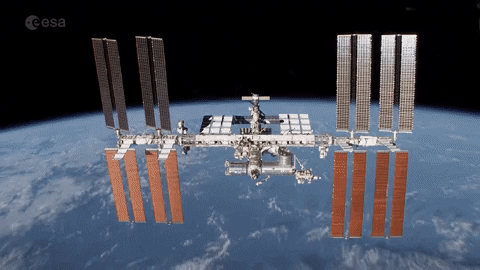ISS - International Space Station logo.
Dec. 22, 2020
International Space Station (ISS). Animation Credit: ESA
Spending time on the International Space Station can go to your head – and your chest. Astronauts experience puffy faces, stuffy noses, expanded blood vessels, and even changes in vision while living in microgravity. These symptoms result from increased fluid in the upper body caused by the absence of gravity to pull fluids downward.
An ESA (European Space Agency) investigation conducted from 2008 to 2012, SOLO, examined the relationship between how much salt astronauts eat and the volume of blood in their chests. Now, the researchers report in a paper that levels of a hormone that helps control sodium in the body increased in individuals who ate more salt in space and on Earth, but the increase was less dramatic in space.
Image above: NASA astronaut Dan Burbank enters data in a computer for the High Salt Diet protocol of the Sodium Loading in Microgravity (SOLO) experiment during Expedition 30. Image Credit: NASA.
The findings have profound implications for years-long trips to Mars and long-term human habitation in space. For example, the volume of blood in vessels in the chest affects the cardiovascular system’s response to gravitational stress when a person stands up on Earth or another celestial body. A decreased amount of blood circulating in the chest could lead to low blood pressure when standing, which could cause fainting. Previous research has identified this effect as a possible issue when astronauts land on Mars after a long space voyage.
Several hormones help control the amount of sodium in our bodies when we eat more or less salt, explains Jens Jordan, study co-author and head of the Institute of Aerospace Medicine at the German Aerospace Center (GCA). Such regulation is important. Too much sodium can lead to excess blood and other bodily fluids, which can cause respiratory problems, high blood pressure, and even heart failure. Too little fluid can cause low blood pressure and dehydration. Sodium levels affect other processes in the body, such as loss of bone. Clearly, proper sodium regulation is important to the overall health and wellbeing of humans, including astronauts in space.
Image above: Mealtime on the International Space Station. The amount of salt in an astronaut’s diet affects sodium levels and the amount of fluid in the body. Image Credit: NASA.
“With the SOLO study, we were particularly interested in the regulation of natriuretic peptides, which are released from the heart in response to sodium loading,” Jordan says. Release of this hormone spurs an increase in the amount of sodium excreted by the kidneys, a process known as natriuresis.
SOLO built on previous research into the mechanisms of fluid and salt retention in the body during spaceflight and bed rest, which simulates spaceflight. For SOLO, crew members increased their fluid intake and ate either a normal or lower-than-normal amount of sodium. Results showed that astronauts had lower levels of cardiac hormones in space compared to when they were on Earth, regardless of the amount of salt they ate. Changes in sodium intake in space did, however, appear to lower the level of natriuretic peptide.
In a related experiment with Russian cosmonauts, the researchers found that fluid content in the chest was significantly reduced in space. Their work also involved bed rest studies, conducted in collaboration with NASA and ESA at the GAC in Cologne, Germany.
Image above: Salt and pepper shakers aboard the International Space Station. From 2008 to 2012, crew members followed diets with normal or lower-than-normal salt intake for SOLO, a study of the relationship between how much salt astronauts eat and volume of blood in the chest. Image Credit: NASA.
“One implication of our work is that the method used to assess fluid volume on Earth may be misleading in microgravity,” says Jordan. In addition, changes in fluid volume in the head and chest may not be related. While astronauts showed dilated neck veins, a sign of fluid volume overload, paradoxically, levels of natriuretic peptides and other measurements suggested low volume of fluid in the chest.
“In the future, we would like to explain this paradoxical finding,” Jordan says. “Human research in space provides insight in the human body that could not be gained in experiments on Earth.” Researchers also suggest a closer look at the role of sodium in blood volume regulation to determine whether the effects are temporary or permanent.
After all, landing on another planet for the first time could definitely go to your head.
Related links:
SOLO: https://www.nasa.gov/mission_pages/station/research/experiments/explorer/Investigation.html?#id=413
Researchers report: https://www.ahajournals.org/doi/10.1161/CIRCULATIONAHA.119.044203
Space Station Research and Technology: https://www.nasa.gov/mission_pages/station/research/overview.html
International Space Station (ISS): https://www.nasa.gov/mission_pages/station/main/index.html
Animation (mentioned), Image (mentioned), Text, Credits: NASA/Michael Johnson/JSC/International Space Station Program Research Office/Melissa Gaskill.
Best regards, Orbiter.ch





